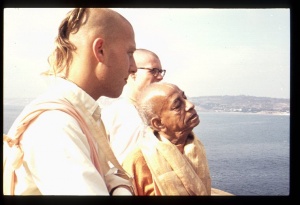SB 9.23.18-19: Difference between revisions
m (1 revision(s)) |
(Vanibot #0018 edit: make synonym terms in Sanskrit italic in SB - Vanisource) |
||
| Line 1: | Line 1: | ||
{{info | {{info | ||
|speaker= | |speaker=Śukadeva Gosvāmī | ||
|listener=King | |listener=King Parīkṣit | ||
}} | }} | ||
[[Category:Srimad-Bhagavatam - Canto 09 Chapter 23]] | |||
[[Category:Bhagavatam Verses Spoken by Sukadeva Gosvami - Vanisource|092318]] | |||
<div style="float:left">'''[[Srimad-Bhagavatam]] - [[SB 9|Ninth Canto]] - [[SB 9.23: The Dynasties of the Sons of Yayati|Chapter 23: The Dynasties of the Sons of Yayāti]]'''</div> | |||
<div style="float:right">[[File:Go-previous.png|link=SB 9.23.17]] '''[[SB 9.23.17]] - [[SB 9.23.20-21]]''' [[File:Go-next.png|link=SB 9.23.20-21]]</div> | |||
{{RandomImage}} | |||
==== TEXTS 18-19 ==== | ==== TEXTS 18-19 ==== | ||
<div | <div class="verse"> | ||
duṣmantaḥ sa punar bheje | :duṣmantaḥ sa punar bheje | ||
sva-vaṁśaṁ rājya-kāmukaḥ | :sva-vaṁśaṁ rājya-kāmukaḥ | ||
yayāter jyeṣṭha-putrasya | :yayāter jyeṣṭha-putrasya | ||
yador vaṁśaṁ nararṣabha | :yador vaṁśaṁ nararṣabha | ||
varṇayāmi mahā-puṇyaṁ | |||
sarva-pāpa-haraṁ nṛṇām | :varṇayāmi mahā-puṇyaṁ | ||
yador vaṁśaṁ naraḥ śrutvā | :sarva-pāpa-haraṁ nṛṇām | ||
sarva-pāpaiḥ pramucyate | :yador vaṁśaṁ naraḥ śrutvā | ||
:sarva-pāpaiḥ pramucyate | |||
</div> | </div> | ||
| Line 21: | Line 27: | ||
==== SYNONYMS ==== | ==== SYNONYMS ==== | ||
<div | <div class="synonyms"> | ||
''duṣmantaḥ''—Mahārāja Duṣmanta; ''saḥ''—he; ''punaḥ bheje''—again accepted; ''sva-vaṁśam''—his original dynasty (the Pūru dynasty); ''rājya-kāmukaḥ''—because of desiring the royal throne; ''yayāteḥ''—of Mahārāja Yayāti; ''jyeṣṭha-putrasya''—of the first son, Yadu; ''yadoḥ vaṁśam''—the dynasty of Yadu; ''nara-ṛṣabha''—O best of human beings, Mahārāja Parīkṣit; ''varṇayāmi''—I shall describe; ''mahā-puṇyam''—supremely pious; ''sarva-pāpa-haram''—vanquishes the reactions of sinful activities; ''nṛṇām''—of human society; ''yadoḥ vaṁśam''—the description of the dynasty of Yadu; ''naraḥ''—any person; ''śrutvā''—simply by hearing; ''sarva-pāpaiḥ''—from all reactions of sinful activities; ''pramucyate''—is freed. | |||
</div> | </div> | ||
| Line 28: | Line 34: | ||
==== TRANSLATION ==== | ==== TRANSLATION ==== | ||
<div | <div class="translation"> | ||
Mahārāja Duṣmanta, desiring to occupy the throne, returned to his original dynasty [the Pūru dynasty], even though he had accepted Maruta as his father. O Mahārāja Parīkṣit, let me now describe the dynasty of Yadu, the eldest son of Mahārāja Yayāti. This description is supremely pious, and it vanquishes the reactions of sinful activities in human society. Simply by hearing this description, one is freed from all sinful reactions. | Mahārāja Duṣmanta, desiring to occupy the throne, returned to his original dynasty [the Pūru dynasty], even though he had accepted Maruta as his father. O Mahārāja Parīkṣit, let me now describe the dynasty of Yadu, the eldest son of Mahārāja Yayāti. This description is supremely pious, and it vanquishes the reactions of sinful activities in human society. Simply by hearing this description, one is freed from all sinful reactions. | ||
</div> | </div> | ||
__NOTOC__ | |||
<div style="float:right; clear:both;">[[File:Go-previous.png|link=SB 9.23.17]] '''[[SB 9.23.17]] - [[SB 9.23.20-21]]''' [[File:Go-next.png|link=SB 9.23.20-21]]</div> | |||
__NOTOC__ | |||
__NOEDITSECTION__ | |||
Revision as of 10:40, 1 December 2017

A.C. Bhaktivedanta Swami Prabhupada
TEXTS 18-19
- duṣmantaḥ sa punar bheje
- sva-vaṁśaṁ rājya-kāmukaḥ
- yayāter jyeṣṭha-putrasya
- yador vaṁśaṁ nararṣabha
- varṇayāmi mahā-puṇyaṁ
- sarva-pāpa-haraṁ nṛṇām
- yador vaṁśaṁ naraḥ śrutvā
- sarva-pāpaiḥ pramucyate
SYNONYMS
duṣmantaḥ—Mahārāja Duṣmanta; saḥ—he; punaḥ bheje—again accepted; sva-vaṁśam—his original dynasty (the Pūru dynasty); rājya-kāmukaḥ—because of desiring the royal throne; yayāteḥ—of Mahārāja Yayāti; jyeṣṭha-putrasya—of the first son, Yadu; yadoḥ vaṁśam—the dynasty of Yadu; nara-ṛṣabha—O best of human beings, Mahārāja Parīkṣit; varṇayāmi—I shall describe; mahā-puṇyam—supremely pious; sarva-pāpa-haram—vanquishes the reactions of sinful activities; nṛṇām—of human society; yadoḥ vaṁśam—the description of the dynasty of Yadu; naraḥ—any person; śrutvā—simply by hearing; sarva-pāpaiḥ—from all reactions of sinful activities; pramucyate—is freed.
TRANSLATION
Mahārāja Duṣmanta, desiring to occupy the throne, returned to his original dynasty [the Pūru dynasty], even though he had accepted Maruta as his father. O Mahārāja Parīkṣit, let me now describe the dynasty of Yadu, the eldest son of Mahārāja Yayāti. This description is supremely pious, and it vanquishes the reactions of sinful activities in human society. Simply by hearing this description, one is freed from all sinful reactions.